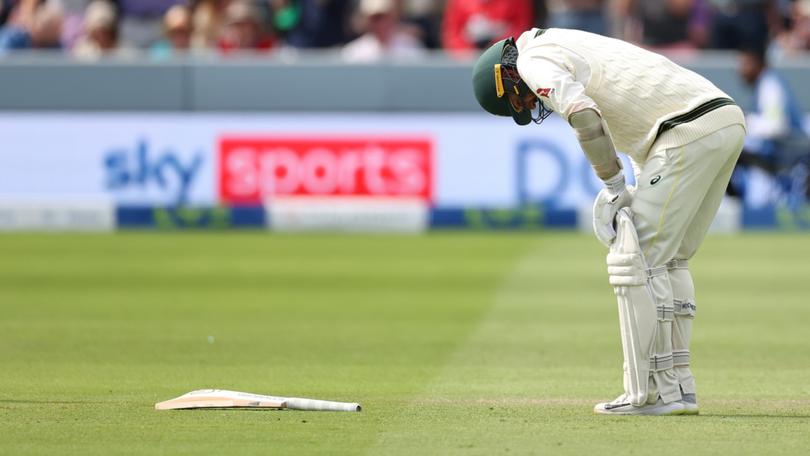MITCHELL JOHNSON: Behind-the-scenes sports documentaries changing the way athletes are viewed
Why are people interested in watching behind-the-scenes documentaries? It gives an insight into the dressing room. But the dressing room was always a safe space for a sportsman, writes Mitchell Johnson.

Season three of The Test documentary series isn’t far away and the recent trailer shows the controversial 2023 Ashes series will be front and centre.
Spinner Nathan Lyon is shown in tears in the rooms after the realisation a significant calf injury had ended his Ashes and most likely the best chance Australia had of winning the series.
The Test will also cover the unacceptable interaction between the Lord’s members and the Australian cricketers in the famous Long Room. We all remember what triggered that response and I’m sure the Johnny Bairstow dismissal will play a big part in the series.
Sign up to The Nightly's newsletters.
Get the first look at the digital newspaper, curated daily stories and breaking headlines delivered to your inbox.
By continuing you agree to our Terms and Privacy Policy.While this type of crowd interaction does unfortunately happen all over the world at different venues, it was shocking because it happened in the most distinguished part of the world’s most prestigious cricket ground.
In England to play county cricket, Lyon told the BBC this week that he believed Australia would have won the Ashes 4-0 if he didn’t get injured.
Hobbling out to bat in Australia’s second innings to try to help set a winning target, Lyon revealed his wife was in tears in the crowd and that the ovation from English fans for his courage meant a lot.
“I probably didn’t understand the level of respect that was shown there and then,” he said.
“That’s something I’m grateful to be able to look back on and reflect. I always thought the majority of England hates me.”
That sums up the love/hate relationship when it comes to the Ashes.
When you play in an Ashes series in England, it’s mentally tough. And the same goes for when England travel to Australia and face the music here.
There are a few differences but ultimately, I can only speak from my experiences and my dealings with that complicated relationship.
I remember my first trip to England for the 2009 Ashes series.
Brett Lee was getting a verbal hammering at Edgbaston. He was ready for it and seemed to enjoy the challenge, giving it back to this one guy in the crowd, who then stopped as his mates started laughing at what Binga had said to him.
Edgbaston is probably up there as one of the hardest places to play from a verbal point of view as the crowd is relentless. But there are ways to deal with it and that’s something you figure out by going through it.
Ricky Ponting used to say we should take it as a compliment. It means they understand you are a threat to their team, you are a standout player and they want to distract you and take your focus away.
I never felt like Lyon, meaning I never felt the England crowds hated me. After Ponting’s words, getting hammered by the crowd made sense to me.

After experiencing a few tough series in England full of verbal diarrhoea day in, day out, over time I used those experiences to learn to ignore it.
And I never really thought about being hated or not. I knew that didn’t matter. What mattered to me was that I could play good cricket for my team and for Australia.
Which brings me back to a question I ask myself and have asked friends before. Why are people interested in watching behind-the-scenes docos such as The Test?
I understand it gives fans an insight into the happenings of what goes on in the dressing room. But still, why?
I guess being a past player, I don’t fully understand not only the fan demand for it but also why the current players are open to letting the cameras in.
Athletes put it all on the line, with their highest highs and lowest lows taking place on the field in front of crowds. But the dressing room was always a safe space for a sportsman.

Other sports have cameras in dressing rooms in those private moments too. I’ve then seen those moments get criticised by many for various reasons.
A blow up in the dressing room after a bad day in the field is a pretty normal thing to happen. Just like bats or gloves being thrown after a dismissal or a few choice words.
Now it all gets seen and the players get critiqued on how they should behave as a professional. Somehow this is accepted as normal human behaviour at club level, yet it’s seen as a disgrace or unprofessional at the top level.
Maybe I’m off the mark here. Maybe most punters like that sort of access. Maybe it normalises sportsmen and that’s a good thing.
Players today have different reasons for wanting to grow their profiles and are getting bigger profiles outside the game amid increased access like this, huge social media followings and booming contracts thanks to the explosion of Twenty20 cricket.
Each to their own, but with it comes more responsibility and the risk of backlash when things don’t go your way or you react in a way someone doesn’t like.
I have never watched any series of The Test. But why would I need too? I’ve lived that life and experienced it all, just in a different time.
